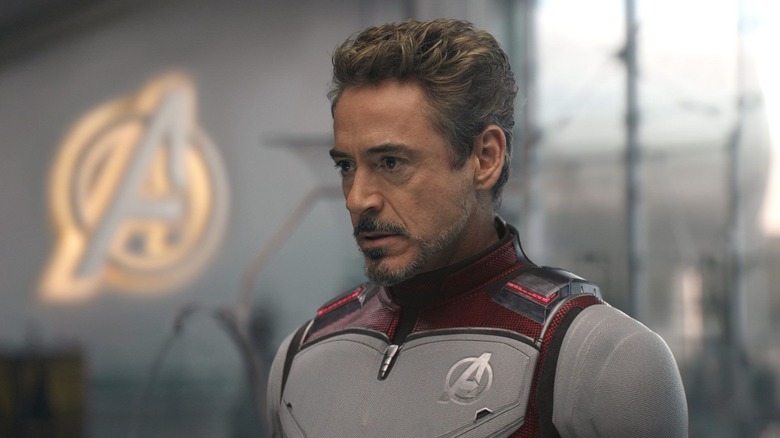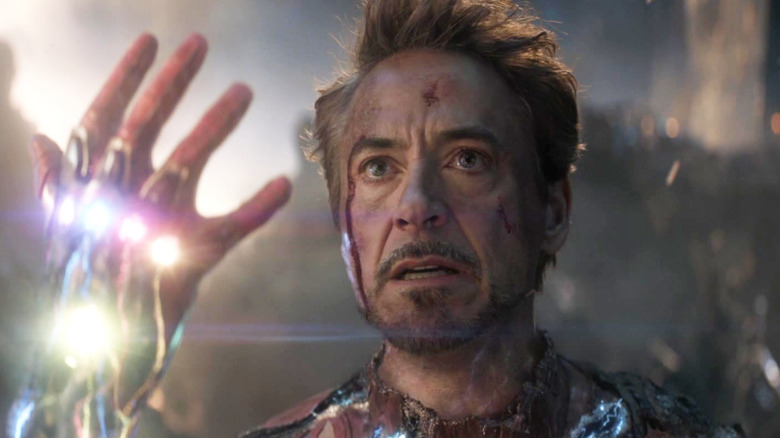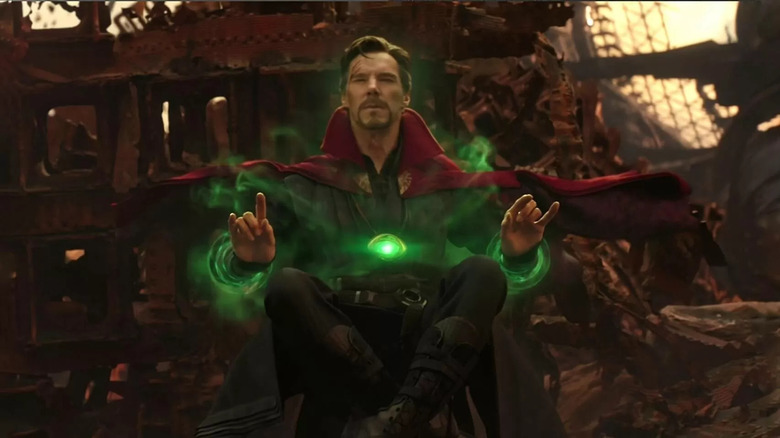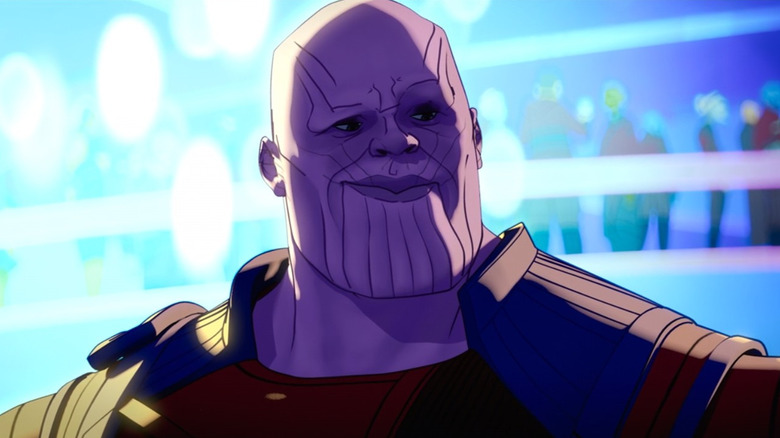Marvel's What If...? Exposes The Biggest Flaw With Avengers: Endgame
The death of Iron Man (Robert Downey, Jr.) at the end of Joe and Anthony Russo's ultra-blockbuster "Avengers: Endgame" is tragic, but not because he sacrificed his life. It's tragic because Tony Stark, with his dying breath, transformed from an ostensible hero into a mass murderer.
"Avengers: Endgame" climaxed with a lengthy battle sequence wherein every known, living character in the Marvel Cinematic Universe assembled to fight the genocidal villain Thanos (Josh Brolin) and his minions. During that battle, heroes and villains fought each other for control of the Infinity Stones, a collection of six magical gems that give their owner the power to do literally anything. In the previous film, "Avengers: Infinity War," Thanos gathered the stones together and used them, with a snap of his fingers, to erase half the population of the universe. Thanos was concerned with dwindling natural resources, overpopulation, and the resulting diminishing quality of life everywhere. He reasoned that killing 50% of all life would allow the universe to heal. While his solution is insane, his concerns are legitimate.
Thanks to some time travel, the Avengers gained possession of the gems and undid Thanos' wish. The population returned.
This was noble of them, although one might wonder why the heroes didn't display a little more imagination when using the Stones. They knew that Thanos was concerned with a lack of resources in the universe and that he was disgusted by the suffering across many, many galaxies. When the heroes regained the Stones, they could only resurrect people. Did they help in any other way? They didn't
This lack of imagination also carried into Iron Man's death and revealed a deep moral failing of the film. Tony Stark snapped his fingers and killed Thanos and his army of minions. His last wish was murder.
Iron Man murders thousands
Let's recount. In the climactic "Endgame" battle, Iron Man briefly comes into possession of the Infinity Stones. In that moment, Tony Stark is essentially a god, capable of using the infinite power at his disposal to wish for anything he wants. Given that he was fighting Thanos, he could have granted Thanos' wish and provided the universe with more resources. He could have quintupled the size of the universe, leaving more space and resources for the population. He could have gone back in time and assured Thanos grew up not to be a maniac. He could have locked Thanos in an alternate dimension where he thinks he won. Instead, he snaps his fingers and murders thousands of battlefield combatants.
Tony Stark is ostensibly a clever character, and his intelligence is touted frequently throughout the MCU. In using the Infinity Gems to kill, Tony revealed that he, too, lacked imagination. He, like Thanos, could only think of the Infinity Stones as a weapon, a means to end the violent battle in front of him by wiping out the opposition. It was a soldier's gambit, not the plan of a genius inventor. It seems that Iron Man had lost himself to the soldiery of the Avengers. After all, what are the Avengers if not a freelance, unlicensed military? It's a team of superpowered soldiers who only know how to fight, i.e. commit acts of violence.
Recall that Tony Stark began his journey as Iron Man so that he could destroy the missiles and bombs previously built by his company. He initially used his Iron Man powers to ensure weapons of mass destruction didn't exist in the world. It's utterly tragic that his final act on Earth was to essentially become a weapon of mass destruction.
But Doctor Strange said...
Some might argue that Tony Stark's final battlefield action was the only necessary action he could take at that moment, as the only way to stop Thanos from killing off the universe was to kill him. This argument is backed up by what Doctor Strange (Benedict Cumberbatch) said in "Avengers: Infinity War." Using his mystical powers, Doctor Strange looked into the future to find a timeline or a path of action wherein the Avengers defeated Thanos. He argued that of the 14,000,605 futures he looked at, he only saw one path to survival.
(That moment dissolved a little tension, of course. If there's a known path to victory, merely follow it. But that's a different issue.)
Later in "Endgame," Tony asks Doctor Strange during the final battle if this was the one path the victory he saw, and Doctor Strange only shoots back a meaningful look. It's communicated to the audience that this is indeed the only path to victory. Thanos, the film argues, is a force of nature that cannot be reasoned with. He will always, always be on his mad quest. It may be academically regrettable, but it's necessary to murder Thanos to save lives. Many audience members exited "Endgame" satisfied with this morally dubious declaration, happy to see a villain slaughtered and the universe saved.
But then came "What If...?," a TV series that presented a 14,000,606th possibility that Doctor Strange didn't think of. In the episode "What If... T'Challa Became a Star-Lord?" it was revealed plainly that Thanos was not a force of nature but an intelligent being that could indeed be reasoned with. And if Thanos could be talked out of his mad plan, that highlights all the more how unnecessary it was to kill him.
Thanos, the hero
In "What If... T'Challa Became a Star-Lord?," T'Challa (Chadwick Boseman), better known in the MCU as the Black Panther, was kidnapped from Earth instead of Peter Quill (Chris Pratt), the main character of "Guardians of the Galaxy." In this alternate version of the story, T'Challa was raised in space among the Ravagers. Because T'Challa is so morally upstanding, he not only grew to be the leader of the space force but transformed it into a more benevolent organization, allowing it to function by a stronger moral code, stealing from the rich and giving to the poor.
THANOS IS ON THE TEAM. It seems that sometime in his space travels, T'Challa encountered Thanos, already hellbent on destroying the universe. T'Challa, however, rather than conceive of a violent head-on assault to kill Thanos, convinced the titan to abandon his mad scheme. This proves that Thanos could have been talked out of committing genocide. Thanos even says "I'm a big enough man to admit when I'm wrong. T'Challa here told me there was more than one way to reallocate the universe's resources." He jokes that mass genocide still would have been efficient, but it was just a joke.
So diplomacy would have worked. An alternate universe would have worked. T'Challa even notes that sometimes the best weapon in one's arsenal is a good argument. Thanos wasn't inevitable, nor did he need to be destroyed. He was only one argument away from heroism. He even was peeved when someone called him "Captain Genocide." Mass battlefield death could have been avoided.
If that was possible, why didn't the Avengers consider it? Why was Iron Man's only recourse to murder Thanos and his minions? Given the chance to do anything in the universe, he chose to kill. That's not heroic at all.



